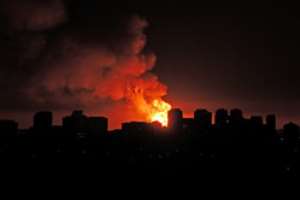
It came on the heels of the Ghana Black Stars’ goalless draw against the Cranes national soccer team of Uganda. As of this writing, the executive officials of the Ghana Football Association (GFA) were widely reported to have filed a complaint with FIFA, the global soccer regulatory body, against the South African national who officiated the match. The GFA officials want Referee Bennett severely sanctioned, including a possible permanent ban from officiating any FIFA-sponsored matches. In the version of the news report that yours truly read, the reporter painstakingly underscored the fact that even a commanding Ghana win over Uganda would still not have significantly brightened the chances of the Black Stars’ qualifying to participate in the 2018 World Cup Finals.
If the reporter is accurate in his rather grim assessment of the chances of the Black Stars’ qualifying for FIFA World Cup Tournament 2018, then about all that one can reasonably say is that the Black Stars ought to maturely and smartly kiss their luck goodbye and hope to do better by scoring within regular playtime, rather than the 93rd minute, in injury time, the next season.
Anyway, as of this writing, the widespread report was that at least 3 people had, so far, perished in the giant balls of fire that engulfed two gas stations in the suburban township of Legon, some 13 miles northeast of Ghana’s capital of Accra (See “How Aljazeera and Daily Mail Reported Atomic Junction Gas Explosion” MyNewsGh.com / Ghanaweb.com 10/8/17). As of this press preparation, however, the figure of fatalities had risen to 7, with some 64 people reportedly discharged from the various hospitals and health centers in the vicinity.
This problem of gas station explosions is fast becoming nauseatingly pedestrian and routine; and it is almost certain that unless a platoon of politicians and/or parliamentarians suffer heavy casualties one of these days, not much is expected to be done anytime soon to address this seemingly perennially intractable menace in the nation’s capital after nearly every heavy downpour. The problem, clearly, has everything to do with the way and manner in which gas stations are built and located in the country; in particular, the question of whether personnel of the country’s Environmental Protection Agency (EPA) are up to snuff with their expertise and responsibilities. This is where the Akufo-Addo government needs to focus its attention the most, not the scarcely foresighted ad-hoc knee-jerk response from operatives of the National Disaster Management Organization (NADMO).
As of this writing, at least 35 people who had reportedly sustained various degrees of injuries had been transported to the nation’s number one health center, the 37th Military Hospital, nearly 10 miles southwest of Legon. This is not the first or second deadly accident of its kind to be recorded in the country in recent years. In 2015, for example, at least 90 people were reported to have burnt to death at a gas station in Central Accra where many of the victims had sought shelter from a heavy downpour of rain. Other reports, back then, put the figure of the incinerated at 150. The real figure, in retrospect, may be somewhere between these two unacceptably high figures. And as I vividly recall, the Mahama-led government of the National Democratic Congress (NDC) commissioned a team of investigators to examine means of forestalling any such similar future occurrences.
Alas, not much appears to have been done to arrest this menace, perhaps because the Mahama government operatives spent most of last year vigorously campaigning for reelection. I would not be surprised, if it turns out that part of Mr. Mahama’s massive electoral loss to his most formidable challenger, then-Candidate Akufo-Addo, had been due to the woeful inability of his government to effectively tackle this perennial gas explosion menace. It is a problem that cannot be attributable to any single individual Ghanaian leader or political party. Indeed, the perennial flooding of many of the major cities and towns of our country predates independence. But it is clearly a problem that can and must be promptly brought under control with the proper township and environmental planning measures put in place and rigidly enforced.
In the aftermath of the 2015 flooding and gas explosion casualties, we all witnessed the then-Deputy Local Government Minister, Mr. NiiLanteVanderpuye, stubbornly and cynically prevent the legitimate demolition of unauthorized houses and structures that had been illegally erected in the pathways of rivers in Ghana’s capital. President Akufo-Addo may need to revisit this demolition plan and devise an even more constructive means of ensuring that Disaster 2015 does not revisit the Ghanaian people, in particular the hardworking residents of the nation’s capital of Accra, ever again.
*Visit my blog at: kwameokoampaahoofe.wordpress.com Ghanaffairs




 Akufo-Addo commissions Phase II of Kaleo solar power plant
Akufo-Addo commissions Phase II of Kaleo solar power plant
 NDC panics over Bawumia’s visit to Pope Francis
NDC panics over Bawumia’s visit to Pope Francis
 EC blasts Mahama over “false” claims on recruitment of Returning Officers
EC blasts Mahama over “false” claims on recruitment of Returning Officers
 Lands Minister gives ultimatum to Future Global Resources to revamp Prestea/Bogo...
Lands Minister gives ultimatum to Future Global Resources to revamp Prestea/Bogo...
 Wa Naa appeals to Akufo-Addo to audit state lands in Wa
Wa Naa appeals to Akufo-Addo to audit state lands in Wa
 Prof Opoku-Agyemang misunderstood Bawumia’s ‘driver mate’ analogy – Miracles Abo...
Prof Opoku-Agyemang misunderstood Bawumia’s ‘driver mate’ analogy – Miracles Abo...
 EU confident Ghana will not sign Anti-LGBTQI Bill
EU confident Ghana will not sign Anti-LGBTQI Bill
 Suspend implementation of Planting for Food and Jobs for 2024 - Stakeholders
Suspend implementation of Planting for Food and Jobs for 2024 - Stakeholders
 Tema West Municipal Assembly gets Ghana's First Female Aircraft Marshaller as ne...
Tema West Municipal Assembly gets Ghana's First Female Aircraft Marshaller as ne...
 Dumsor is affecting us double, release timetable – Disability Federation to ECG
Dumsor is affecting us double, release timetable – Disability Federation to ECG
